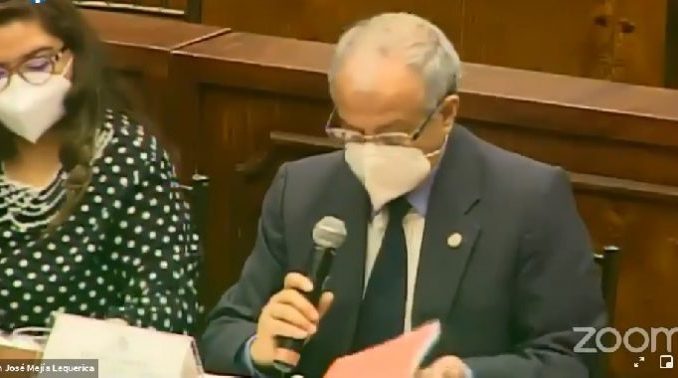
As part of the impeachment process against the former subrogate comptroller, Pablo Celi, accused of non-fulfillment of functions by the interpellant assemblyman Juan Cristóbal Lloret (UNES), the president of the Contentious Electoral Tribunal (TCE), Arturo Cabrera, told the Commission of Supervision of the National Assembly that the Electoral Function should receive a guarantee of respect for the independence, the process and the exclusive powers in electoral matters.
Cabrera preferred not to delve into the case that refers to the interference of the Comptroller’s Office in the Electoral Function since he could commit prevarication, since it has not yet been resolved in the Constitutional Court.
After the Comptroller’s report that recommended to the National Electoral Council (CNE) to nullify the legal status of four political movements, there was a complaint before the Contentious Court for electoral infraction presented by the organization Fuerza Compromiso Social. This is due to the fact that on July 8, 2020, the deputy comptroller, Pablo Celi, submitted a request for a conflict of powers to the Constitutional Court to see if the TCE should address this issue or a Contentious Administrative Court.
Being the subject of a demand for powers, Cabrera pointed out that he cannot refer to that complaint, but said that it has been suspended since July 25, 2020 that a letter was received.
“We are going to complete a year that this case about interference in the electoral process is suspended and without resolution, but on that we judges cannot pronounce ourselves because we can prevaricate,” he reiterated.
Legislator Pedro Velasco questioned this fact since in electoral matters the Court would have the last word.
To this concern about delay, Cabrera responded that in electoral processes conflicts are always generated and that as part of due process all the resources that political subjects, organizations and entities interpose must be attended to.
The head of the TCE mentioned that it is not possible to interfere in the functions of another institution and that it is necessary to wait patiently, but what they can do is insist that the electoral calendar timeline be taken into account to resolve these cases.
He argued that if the Court gives them the reason to hear that case, the TCE will immediately issue its resolution.
He clarified that what the last elections demonstrated is the CNE’s ability to recover and accept its error in carrying out a legitimate process.
He commented that after the recommendations made to the CNE to review the situation of the four political organizations, because rights were violated, only Libertad es Pueblo lost legal status.
He exclaimed that this CNE with the electoral process has been the one that has set the worst examples so that it interferes in the functioning of the electoral bodies.
He said that it was the same counselors who made two ordinary judges intervene to avoid their removal requested by a judge of the Court.
He reported that this request for removal was appealed and that it has yet to be resolved.
Once Fernando Villavicencio, president of the Oversight Commission, gave way to Lloret, as interpellant, he insisted that interference cannot be allowed and that the one who must administer as an electoral body and issue rulings is the Court because this is established by the Constitution and the Code of Democracy.

Be the first to comment